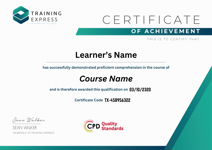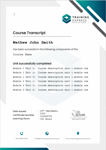
Diploma in Effective Teaching Principles for the 21st Century for Teaching Assistant
9 FREE Certificates | 9 CPD Accredited Courses | Unlimited Retake | Lifetime Access
Training Express Ltd
Summary
- Digital certificate - Free
- Hard copy certificate - Free
- Exam(s) / assessment(s) is included in price
- Tutor is available to students
Add to basket or enquire
Overview
Step into the dynamic world of education with our comprehensive Diploma in Effective Teaching Principles for the 21st Century for Teaching Assistants. As the education landscape evolves, there's an increasing demand for skilled teaching assistants adept in modern methodologies. In the UK alone, the teaching assistant workforce is projected to grow by 5% by 2028, offering ample opportunities for career progression and job stability.
With a curriculum meticulously designed to cover key aspects such as lesson planning, SEN support, phonics teaching, EYFS, leadership, remote teaching, and job acquisition strategies, this diploma equips you with the knowledge and skills essential for success in the field. Whether you're aspiring to become a teaching assistant, SEN teaching assistant, or even progress to a leadership role, this course provides a solid foundation.
Join us to embark on a rewarding journey in education, where every day brings new challenges and opportunities to make a positive impact on young minds.
Key Features:
- CPD Certified
- Instant e-certificate and hard copy dispatch by next working day
- Fully online, interactive course with audio voiceover
- Developed by qualified professionals in the field
- Self-paced learning and laptop, tablet, smartphone-friendly
- 24/7 Learning Assistance
- Discounts on bulk purchases
CPD
Course media
Resources
- Training Express Brochure - download
Description
Lesson Planning for Teaching
- Module 01: An Introduction to Planning and Teaching
- Module 02: Planning and Preparation in Teaching
- Module 03: Curriculum
- Module 04: Structure and Format
- Module 05: Methodology
- Module 06: Objectives and Learning Aims
- Module 07: Assessment and Evaluation
Level 3 Teaching Assistant
- Module 01: Teaching Assistant Overview
- Module 02: Professional Developments for a TA
- Module 03: Working with the School and its Policies
- Module 04: Discussion on Curriculum, Assessment and Monitoring
- Module 05: Providing the Best Learning Environment
- Module 06: Learn to Implement ICT, Literacy and Numeracy Development Process as a TA
- Module 07: Child Development and the SEN Support
- Module 08: Understanding Behaviour & Relationships as a TA
- Module 09: Experienced TAs Maintain Strong Communications with The Students
- Module 10: Career Prospects for TA in the UK
SEN Teaching Assistant
- Module 01: Special Education Needs (SEN) An Overview
- Module 02: SEN Support
- Module 03: High-Quality Teaching for Pupils with SEN
- Module 04: SEN Teaching Methodologies
- Module 05: Communication and Interaction
- Module 06: Cognition and Learning
- Module 07: Social, Emotional and Mental Health Difficulties
- Module 08: Sensory or Physical Needs
- Module 09: Working in Partnership
Phonics Teaching Diploma
- Module 1. Introduction to Phonics Education
- Module 2. Role of Early Phonics Teaching
- Module 3. Career as a Phonics Teacher
- Module 4. Teaching Phonics
- Module 5. Jolly Phonics
- Module 6. Involving Parents and Carers
- Module 7. Speaking and Phonological Awareness
- Module 8. Systematic Assessment and Record-Keeping
- Module 9. Meeting Individual Needs
- Module 10: Cognitive Approaches in Dyslexia
- Module 11: Phonics for Deaf Children
- Module 12: Teaching Higher Level of Phonics
EYFS Teaching Assistant
- Module 01: Introduction to EYFS
- Module 02: Importance of Early Years in Development
- Module 03: EYFS Teaching Techniques
- Module 04: Working as an EYFS Teacher
- Module 05: Promoting Learning and Development
- Module 06: Children Having Special Education Needs or Disabilities
- Module 07: Parents’ Guide to the Early Years Foundation Stage
- Module 08: Welfare Requirements
- Module 09: The EYFS Educational Philosophies and Privileges
- Module 10: Registration, Inspection, and Quality Improvement
- Module 11: EYFS Framework in 2021
SEN Teaching Assistant and SENCO Training
- Module 01: Special Education Needs (SEN): An Overview
- Module 02: SEN Support
- Module 03: High-Quality Teaching for Pupils with SEN
- Module 04: SEN Teaching Methodologies
- Module 05: Communication and Interaction
- Module 06: Cognition and Learning
- Module 07: Social, Emotional and Mental Health Difficulties
- Module 08: Sensory or Physical Needs
- Module 09: The SENCO Role in Policy and Practice
- Module 10: Roles and Responsibilities within whole School SEN Co-ordination
- Module 11: The SENCO and the Senior Leadership Team
- Module 12: Supporting Colleagues and working with Professionals and Organisations beyond the School
- Module 13: Developing Relationships with Pupils and Parents
- Module 14: SENCO’s Role in Leading and Managing SEND Administration
- Module 15: Challenges and Opportunities
- Module 16:Developing Inclusive Practice and the Future SENCO Role
Leadership in Teaching
- Module 01: An introduction to Leadership in Teaching
- Module 02: Teacher Leadership
- Module 03: The Skills of Teacher Leadership
- Module 04: What Teacher Leaders Need to Know
- Module 05: Stressors and Stress Management in Schools
- Module 06: Mentoring as part of effective leadership
- Module 07: Effects of Good Mentoring on Quality of Teaching
- Module 08: Main Areas of Activity in Teacher leadership
- Module 09: Mental Health in the Workplace
- Module 10: Understanding Mental Health in Children
- Module 11: Understanding SEN in children
- Module 12: Confidentiality and legislation
Remote Teaching
- Module 01: Introduction to Remote Teaching
- Module 02: Remote Teaching Strategies
- Module 03: Remote Teaching Tools
- Module 04: Remote Teaching Methods
- Module 05: Instructional Strategies & Final Tips
The Complete Guide To Getting A Teaching Job
- Module 01: Introduction
- Module 02: Job Search
- Module 03: A Winning Resume and Cover Letter
- Module 04: Interviews
- Module 05: Conclusion
Learning Outcomes:
- Plan and execute effective lessons aligned with curriculum standards.
- Support diverse learning needs, including SEN and phonics education.
- Foster a conducive learning environment promoting student engagement and development.
- Develop strong communication and collaboration skills with colleagues, students, and parents.
- Demonstrate leadership qualities and stress management techniques in educational settings.
- Utilize remote teaching tools and strategies for effective online instruction.
Accreditation
All of our courses are fully accredited, including this Diploma in Effective Teaching Principles for the 21st Century for Teaching Assistant Course, providing you with up-to-date skills and knowledge and helping you to become more competent and effective in Teaching Principles for the 21st Century for Teaching Assistant.
Certification
Once you’ve successfully completed your Diploma in Effective Teaching Principles for the 21st Century for Teaching Assistant Course, you will immediately be sent a digital certificate. Also, you can have your printed certificate delivered by post (shipping cost £3.99). Our Diploma in Effective Teaching Principles for the 21st Century for Teaching Assistant Course certification has no expiry dates, although we do recommend that you renew them every 12 months.
Who is this course for?
This Diploma in Effective Teaching Principles for the 21st Century for Teaching Assistant Course can be taken by anyone who wants to understand more about the topic. With the aid of this course, you will be able to grasp the fundamental knowledge and ideas. Additionally, this Diploma in Effective Teaching Principles for the 21st Century for Teaching Assistant Course is ideal for:
- Individuals aspiring to become teaching assistants in diverse educational settings.
- Current teaching assistants seeking professional development and career advancement.
- Individuals interested in specializing in SEN support or phonics teaching.
- Aspiring educational leaders looking to enhance their leadership skills.
- Anyone seeking comprehensive guidance on securing teaching jobs in the UK.
Requirements
Learners do not require any prior qualifications to enrol on this Diploma in Effective Teaching Principles for the 21st Century for Teaching Assistant Course. You just need to have an interest in Diploma in Effective Teaching Principles for the 21st Century for Teaching Assistant Course.
Career path
After completing this Diploma in Effective Principles for the 21st Century for Teaching Assistant Course you will have a variety of careers to choose from:
- Teaching Assistant - £18K to £25K/year
- SEN Teaching Assistant - £18K to £27K/year
- EYFS Teaching Assistant - £18K to £25K/year
- SENCO (Special Educational Needs Coordinator) - £30K to £45K/year
- Mental Health Mentor in Schools - £20K to £30K/year
Questions and answers
Currently there are no Q&As for this course. Be the first to ask a question.
Certificates
Digital certificate
Digital certificate - Included
Once you’ve successfully completed your course, you will immediately be sent a FREE digital certificate.
Hard copy certificate
Hard copy certificate - Included
Also, you can have your FREE printed certificate delivered by post (shipping cost £3.99 in the UK).
For all international addresses outside of the United Kingdom, the delivery fee for a hardcopy certificate will be only £10.
Our certifications have no expiry dates, although we do recommend that you renew them every 12 months.
Reviews
Currently there are no reviews for this course. Be the first to leave a review.
Legal information
This course is advertised on reed.co.uk by the Course Provider, whose terms and conditions apply. Purchases are made directly from the Course Provider, and as such, content and materials are supplied by the Course Provider directly. Reed is acting as agent and not reseller in relation to this course. Reed's only responsibility is to facilitate your payment for the course. It is your responsibility to review and agree to the Course Provider's terms and conditions and satisfy yourself as to the suitability of the course you intend to purchase. Reed will not have any responsibility for the content of the course and/or associated materials.






